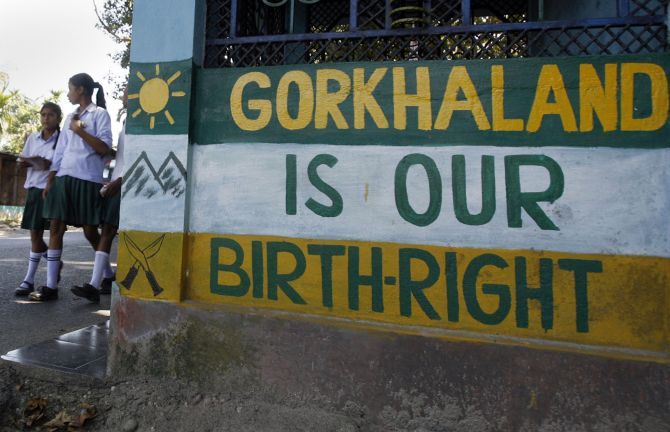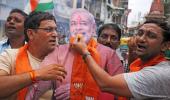The statehood issue and implementation of the sixth schedule of the Constitution have been the major demands in the hills since the beginning of the protracted Gorkhaland movement in 1986.

The Centre's decision to revoke provisions of Article 370 and bifurcate Jammu and Kashmir has rekindled hope among the major hill parties, which want Darjeeling to be a separate Union territory with a legislature.
The Bharatiya Janata Party MP from Darjeeling, Raju Bista, said he was hopeful that the saffron party's promise of a "permanent political solution" in the hills would be a reality by 2024.
The ruling Trinamool Congress, however, said it would oppose any move to bifurcate West Bengal.
The Centre had on Monday revoked Article 370, which granted special status to Jammu and Kashmir, and proposed bifurcation of the state into two Union territories -- Jammu and Kashmir, and Ladakh.
The Bimal Gurung-led Gorkha Janamukti Morcha faction, which supports the BJP, said the saffron party should keep its poll promise of a permanent political solution in the hills, which have witnessed violent agitation for the past few decades over the demand of a separate statehood.
"We have been demanding a separate state of Gorkhaland for a number of years. The BJP in its manifesto had also promised a permanent political solution," GJM general secretary Roshan said, quoting party supremo Gurung.
"We think this is the appropriate time for the Centre to carve a Union territory with legislature. We would soon start agitation over this," Roshna said.
The statehood issue and implementation of the sixth schedule of the Constitution have been the major demands in the hills since the beginning of the protracted Gorkhaland movement in 1986.
Darjeeling witnessed one of its most violent agitations -- a 104-day-long strike -- over the demand of a separate statehood in June 2017, leading to death of several locals and security personnel.
The GJM's call for Darjeeling to be a Union territory was backed by the Gorkha National Liberation Front, which felt it would be the most suitable solution for the problem.
"The demand of a separate state may be a long-drawn process, but we think a Union territory with legislature would be accepted by all the stateholders,"
GNLF leader N V Chetri said. "The present governing body of the hills, the Gorkhaland Territorial Administration, has failed to deliver," he added.
The views of the GJM and the GNLF also found support from several smaller outfits in the hills.
BJP MP Bista said he respected the views of the hill parties, adding that all options would be discussed while deciding on a solution.
"I can assure that the BJP would keep its promise of a permanent political solution," Bista said.
"All the options -- be it Gorkhaland, Union territory with legislature or any other -- would be discussed with all the stakeholders before taking a final call," he added.
Several state BJP leaders, however, declined to comment on the issue, but exuded confidence that the central government would come up with a solution to the decades-old problem.
The BJP, which was once sympathetic to the Gorkhaland statehood demand, has been stressing on the restoration of democracy in the region and the end of the "reign of terror by the police", which, it alleged, started since the 2017 agitation.
Bista, supported by Gurung and several other hill parties, was elected from the Darjeeling Lok Sabha seat by a record margin in the 2019 general election.
The demand of a Union territory with legislature was, however, ruled out by the GJM faction supported by the TMC, which said the BJP had for the last 10 years "fooled" the people of the hills with the "lollypop of separate statehood".
"Neither the BJP nor Bimal Gurung are serious about the problems of the people of the hills. They just want to exploit them to serve their own political purpose," said Binay Tamang, the leader of the GJM faction supported by the TMC.
Senior TMC leader Gautam Deb said it would never favour the state's bifurcation. "The BJP's policy is to divide, break and rule. But, we won't allow it in Bengal," the minister added.
Darjeeling is a picturesque hill town and the area is ethnically dominated by the Gorkhas. The place, known for its world-renowned tea, is also inhabited by the Lepchas, Sherpas, Bhutias among others.
Several political parties have over the years promised the people of the hills a separate state and implementation of the sixth schedule, which grants more autonomy to a region.
The demand for a separate state was first made in the 1980s, with the Subhas Ghisingh-led GNLF launching a violent agitation in 1986, which went on for 43 days and led to the death of 1,200 people in the hills.
The movement culminated in the formation of the Darjeeling Gorkha Hill Council in 1988, following the intervention of then prime minister Rajiv Gandhi and West Bengal chief minister Jyoti Basu.
The separate statehood demand gained momentum yet again in 2007 after the formation of the GJM, under the leadership of Bimal Gurung, who was once a trusted aide of Ghisingh.
After the TMC took over the reins of the state in 2011 by ending the 34-year Left rule, the Gorkhaland Territorial Administration was formed with Gurung as its chief.
But, peace was short-lived in the area as Gurung led an agitation in support of the statehood demand, first in 2013, and then engineered a 104-day-long strike in 2017, accusing the TMC government of trying to "wipe out" Gorkha identity.











 © 2025
© 2025